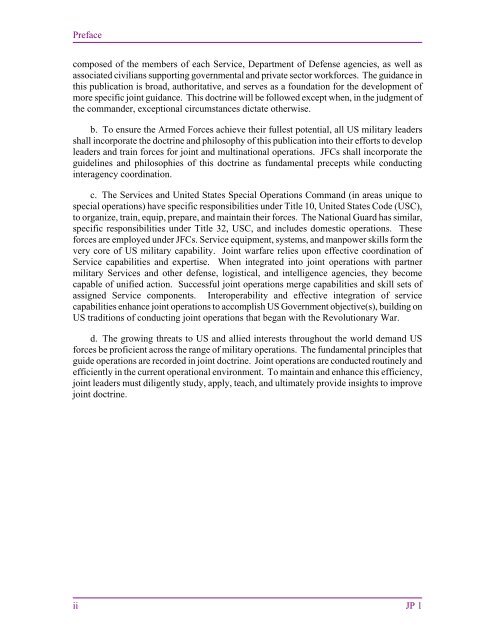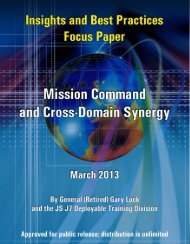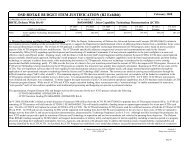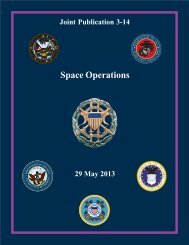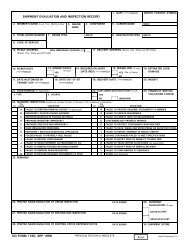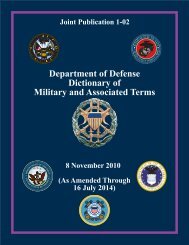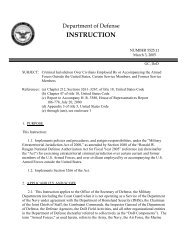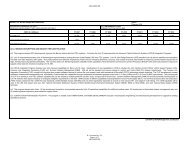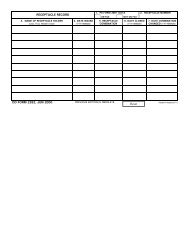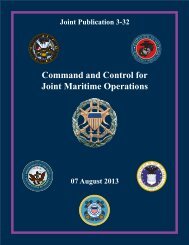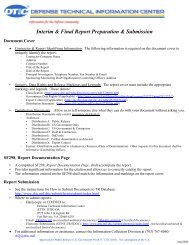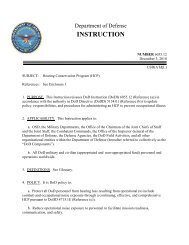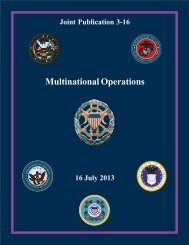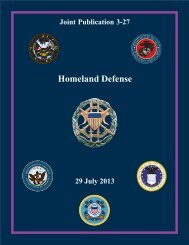JP 1, Doctrine for the Armed Forces of the United States - Defense ...
JP 1, Doctrine for the Armed Forces of the United States - Defense ...
JP 1, Doctrine for the Armed Forces of the United States - Defense ...
You also want an ePaper? Increase the reach of your titles
YUMPU automatically turns print PDFs into web optimized ePapers that Google loves.
Preface<br />
composed <strong>of</strong> <strong>the</strong> members <strong>of</strong> each Service, Department <strong>of</strong> <strong>Defense</strong> agencies, as well as<br />
associated civilians supporting governmental and private sector work<strong>for</strong>ces. The guidance in<br />
this publication is broad, authoritative, and serves as a foundation <strong>for</strong> <strong>the</strong> development <strong>of</strong><br />
more specific joint guidance. This doctrine will be followed except when, in <strong>the</strong> judgment <strong>of</strong><br />
<strong>the</strong> commander, exceptional circumstances dictate o<strong>the</strong>rwise.<br />
b. To ensure <strong>the</strong> <strong>Armed</strong> <strong>Forces</strong> achieve <strong>the</strong>ir fullest potential, all US military leaders<br />
shall incorporate <strong>the</strong> doctrine and philosophy <strong>of</strong> this publication into <strong>the</strong>ir ef<strong>for</strong>ts to develop<br />
leaders and train <strong>for</strong>ces <strong>for</strong> joint and multinational operations. JFCs shall incorporate <strong>the</strong><br />
guidelines and philosophies <strong>of</strong> this doctrine as fundamental precepts while conducting<br />
interagency coordination.<br />
c. The Services and <strong>United</strong> <strong>States</strong> Special Operations Command (in areas unique to<br />
special operations) have specific responsibilities under Title 10, <strong>United</strong> <strong>States</strong> Code (USC),<br />
to organize, train, equip, prepare, and maintain <strong>the</strong>ir <strong>for</strong>ces. The National Guard has similar,<br />
specific responsibilities under Title 32, USC, and includes domestic operations. These<br />
<strong>for</strong>ces are employed under JFCs. Service equipment, systems, and manpower skills <strong>for</strong>m <strong>the</strong><br />
very core <strong>of</strong> US military capability. Joint warfare relies upon effective coordination <strong>of</strong><br />
Service capabilities and expertise. When integrated into joint operations with partner<br />
military Services and o<strong>the</strong>r defense, logistical, and intelligence agencies, <strong>the</strong>y become<br />
capable <strong>of</strong> unified action. Successful joint operations merge capabilities and skill sets <strong>of</strong><br />
assigned Service components. Interoperability and effective integration <strong>of</strong> service<br />
capabilities enhance joint operations to accomplish US Government objective(s), building on<br />
US traditions <strong>of</strong> conducting joint operations that began with <strong>the</strong> Revolutionary War.<br />
d. The growing threats to US and allied interests throughout <strong>the</strong> world demand US<br />
<strong>for</strong>ces be pr<strong>of</strong>icient across <strong>the</strong> range <strong>of</strong> military operations. The fundamental principles that<br />
guide operations are recorded in joint doctrine. Joint operations are conducted routinely and<br />
efficiently in <strong>the</strong> current operational environment. To maintain and enhance this efficiency,<br />
joint leaders must diligently study, apply, teach, and ultimately provide insights to improve<br />
joint doctrine.<br />
ii <strong>JP</strong> 1


